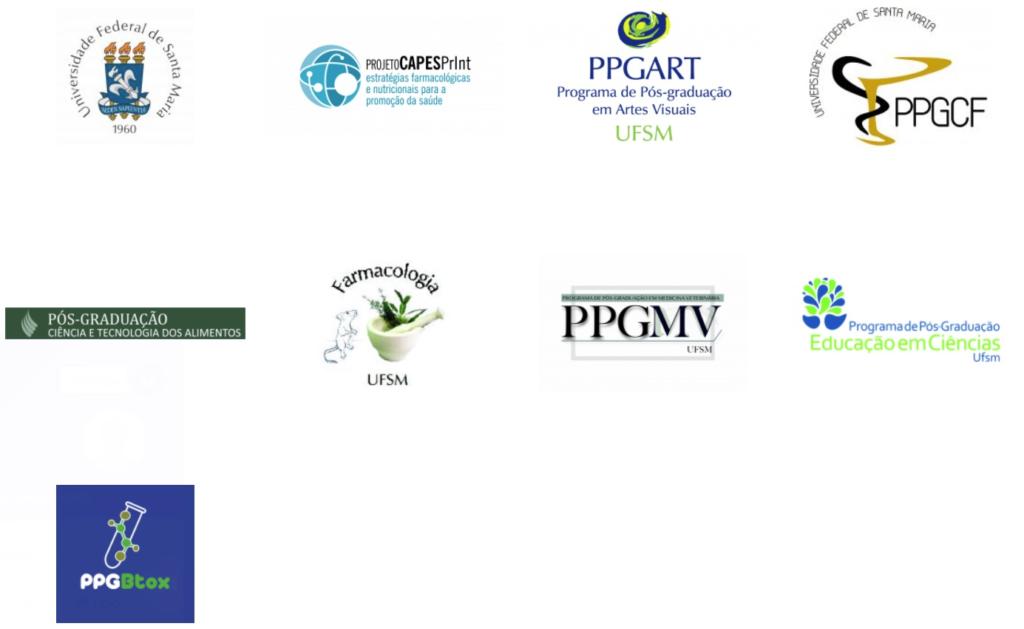
We are glad to welcome you to the International Webinar One Health over Borders – Capes/PrInt-UFSM. The Webinar is fully virtual and will be held by the Federal University of Santa Maria/Brazil, on November 23 to 25, 2021. The One Health Concept highlights the inseparable relationship between all living species and the environment that are interconnected in a symbiotic way.
Since its creation in 2004, the One Health Concept has been recognized and promoted by the United Nations and other relevant international scientific and socioeconomic players. Moreover, the emergence of the coronavirus 2019 pandemic showed the urgency of this transdisciplinary approach. However, infectious diseases are not the only threat to the human and animal health. Anthropogenic activity may pose many other risks to the maintenance of life on Earth. Thus, the development of medicines and interventions to fight non-communicable diseases and the production of safe, healthy and affordable food while assuring animal welfare and ecofriendly practices are current challenges.
The International Webinar “One Health over Borders – Capes/PrInt-UFSM” will merge the disciplinary frontiers by joining distinguished speakers in round-table transdisciplinary sessions to discuss integrative solutions for current animal-environment-human challenges. The Webinar is organized within the CAPES-PrInt Internationalization Program from the Federal University of Santa Maria. Since 2018, the CAPES-PrInt Program supports the cooperation of researchers from UFSM with foreign partners under two network interdisciplinary projects within the One Health theme: Animal health and welfare and Pharmacological and nutritional strategies for health promotion. By articulating researchers from different areas of knowledge, such as animal health and welfare, human health, food safety, education in science and visual arts, the Webinar is expected to host holistic discussions that enable accelerating the knowledge progress within these different areas and making an effective contribution to the promotion of public health.
We are counting on your participation to make this webinar a great success. We wish everyone an excellent event!
The organizing committee.
REGISTRATION
CLICK HERE to registration.
SPEAKERS AND CHAIRS
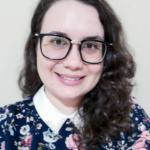 Dr. Alessandra Marcon Gasperini was born in Concordia, SC, Brazil in 1990. She graduated in Food Technology at Federal Technological University of Paraná – UTFPR (2012). She received a master’s degree in Food Science from the State University of Campinas – UNICAMP (2014), and a Ph.D. in Environment & AgriFood – Applied Mycology from Cranfield University, England (2019). Her research endeavour is dedicated to development of prospective biocontrol products, novel approaches to mitigate fungal contamination and mycotoxins in the food chain, studies of fungal ecophysiology and resilience under climate change conditions. Currently, she holds a postdoctoral position in the Laboratory of Food Mycology at Federal University of Santa Maria – UFSM through the CAPES PrInt program.
Dr. Alessandra Marcon Gasperini was born in Concordia, SC, Brazil in 1990. She graduated in Food Technology at Federal Technological University of Paraná – UTFPR (2012). She received a master’s degree in Food Science from the State University of Campinas – UNICAMP (2014), and a Ph.D. in Environment & AgriFood – Applied Mycology from Cranfield University, England (2019). Her research endeavour is dedicated to development of prospective biocontrol products, novel approaches to mitigate fungal contamination and mycotoxins in the food chain, studies of fungal ecophysiology and resilience under climate change conditions. Currently, she holds a postdoctoral position in the Laboratory of Food Mycology at Federal University of Santa Maria – UFSM through the CAPES PrInt program.
 Dr. Ana Flávia Furian has a degree in Pharmacy-Biochemistry from the Federal University of Santa Maria (2005), a Master’s (2007) and a Ph.D. (2009) in Biological Sciences: Biochemistry from the Federal University of Rio Grande do Sul. She is an Associate Professor at the Federal University of Santa Maria (UFSM), and advisor of the Postgraduate Programs in Pharmacology and Food Science and Technology at the Federal University of Santa Maria. Her main line of research is the characterization of toxic effects (behavioral and biochemical) induced by acute exposure to mycotoxins (zearalenone, fumonisin B1 and aflatoxin B1).
Dr. Ana Flávia Furian has a degree in Pharmacy-Biochemistry from the Federal University of Santa Maria (2005), a Master’s (2007) and a Ph.D. (2009) in Biological Sciences: Biochemistry from the Federal University of Rio Grande do Sul. She is an Associate Professor at the Federal University of Santa Maria (UFSM), and advisor of the Postgraduate Programs in Pharmacology and Food Science and Technology at the Federal University of Santa Maria. Her main line of research is the characterization of toxic effects (behavioral and biochemical) induced by acute exposure to mycotoxins (zearalenone, fumonisin B1 and aflatoxin B1).
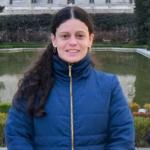 Dr. Ana Paula Gottlieb Almeida graduated in Biology at Universidade Federal de Santa Maria (UFSM) (2011), Master (2014) and Doctoral (2018) degree in Animal Biodiversity in the same institution. Postdoctoral fellowship at Instituto de Ciencias Marinas de Anadalucía in Spain (2019) and UFSM (2020). Has experience in fish physiology with a focus on research on the use of essential oils as growth promoters and stress reducing agents, digestive enzyme activity and molecular biology such as gene cloning and gene expression of stress- and digestive enzyme-related genes.
Dr. Ana Paula Gottlieb Almeida graduated in Biology at Universidade Federal de Santa Maria (UFSM) (2011), Master (2014) and Doctoral (2018) degree in Animal Biodiversity in the same institution. Postdoctoral fellowship at Instituto de Ciencias Marinas de Anadalucía in Spain (2019) and UFSM (2020). Has experience in fish physiology with a focus on research on the use of essential oils as growth promoters and stress reducing agents, digestive enzyme activity and molecular biology such as gene cloning and gene expression of stress- and digestive enzyme-related genes.
 Dr. Ayodeji Augustine Olabiyi (Ph.D. Applied Biochemistry, Akure) is a Senior Lecturer at the College of Medicine and Health Sciences, Department of Medical Biochemistry, Afe Babalola University, Ado Ekiti, Nigeria. In the course of his Doctoral training, he won an award from TWAS/CNPQ (2015) to visit the laboratory of Prof M.R.C Schetinger at the Department of Biochemistry and Molecular Biology (Center of Natural and Exacts Sciences), where he researched on natural food product’s intervention on erectile function evaluating some relevant biomolecules, and their possible effect on the purinergic signaling. After completing his PhD, won a postdoctoral fellowship award grant by CAPES (2020) in Federal University of Santa Maria to work in the laboratory of Prof Daniel B.R. Leal. He has published several scientific articles in peer review journals of high impact factor from his research. Dr. Olabiyi research focus is Functional foods and Nutraceuticals, Phytomedicine and Neuro-Biochemistry.
Dr. Ayodeji Augustine Olabiyi (Ph.D. Applied Biochemistry, Akure) is a Senior Lecturer at the College of Medicine and Health Sciences, Department of Medical Biochemistry, Afe Babalola University, Ado Ekiti, Nigeria. In the course of his Doctoral training, he won an award from TWAS/CNPQ (2015) to visit the laboratory of Prof M.R.C Schetinger at the Department of Biochemistry and Molecular Biology (Center of Natural and Exacts Sciences), where he researched on natural food product’s intervention on erectile function evaluating some relevant biomolecules, and their possible effect on the purinergic signaling. After completing his PhD, won a postdoctoral fellowship award grant by CAPES (2020) in Federal University of Santa Maria to work in the laboratory of Prof Daniel B.R. Leal. He has published several scientific articles in peer review journals of high impact factor from his research. Dr. Olabiyi research focus is Functional foods and Nutraceuticals, Phytomedicine and Neuro-Biochemistry.
 Dr. Bernardo Baldisserotto received his Bachelor in Biological Oceanography by Universidade Federal do Rio Grande, FURG (1983), Master and Doctorate in General Physiology by Universidade de São Paulo, USP (1987 and 1991, respectively), Postdoctorate at MacMaster University, MAC, Canada (2002). Full professor at the Universidade Federal de Santa Maria. Research field: Physiology and Pharmacology of aquatic animals, mainly fish.
Dr. Bernardo Baldisserotto received his Bachelor in Biological Oceanography by Universidade Federal do Rio Grande, FURG (1983), Master and Doctorate in General Physiology by Universidade de São Paulo, USP (1987 and 1991, respectively), Postdoctorate at MacMaster University, MAC, Canada (2002). Full professor at the Universidade Federal de Santa Maria. Research field: Physiology and Pharmacology of aquatic animals, mainly fish.
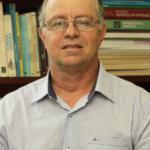 Dr. Cesar Koppe Grisolia graduated in Biomedical Sciences at the University of São Paulo (USP) in 1981. Master’s Degree in Genetics at the University of São Paulo (1985) and Ph.D. in Genetics at the University of São Paulo (1991). Post-doctorate in Ecotoxicology, University of Aveiro (Portugal, 2008). Currently, professor at the Department of Genetics and Morphology at the Institute of Biological Sciences at the University of Brasília. Head of the Laboratory of Toxicologic Genetics at the University of Brasília. Research with focus in environmental mutagenesis, ecogenotoxicology and ecotoxicology. Researcher of the Brazilian National Council for Scientific and Technological Development (CNPq), level 1-D.
Dr. Cesar Koppe Grisolia graduated in Biomedical Sciences at the University of São Paulo (USP) in 1981. Master’s Degree in Genetics at the University of São Paulo (1985) and Ph.D. in Genetics at the University of São Paulo (1991). Post-doctorate in Ecotoxicology, University of Aveiro (Portugal, 2008). Currently, professor at the Department of Genetics and Morphology at the Institute of Biological Sciences at the University of Brasília. Head of the Laboratory of Toxicologic Genetics at the University of Brasília. Research with focus in environmental mutagenesis, ecogenotoxicology and ecotoxicology. Researcher of the Brazilian National Council for Scientific and Technological Development (CNPq), level 1-D.
 Dr. Daniele Rubert Nogueira Librelotto obtained a Bachelor’s degree in Industrial Pharmacy in 2006 and a Master Degree in Pharmaceutical Sciences in 2009 from Universidade Federal de Santa Maria (UFSM, Brazil). In 2010 and 2013, she received Master and PhD degrees in Research, Development and Quality Control of Medicines from Universitat de Barcelona (Spain), respectively. For the studies developed during this period, she received from the Universitat de Barcelona (Spain) the Extraordinary Master Award in 2012 and the Extraordinary Doctorate Award in 2014. Between 2013 and 2020, she developed his postdoctoral research at UFSM on nanotechnology and in vitro models for the assessment of antitumor activity of targeted nanoparticles encapsulating different drugs. During this period, she held different fellowships, from PNPD-CAPES, CNPq-PDJ and CAPES-PrInt program. During her PostDoc, in 2015 she spent a month in the laboratory of Prof. Rita Muzzalupo in the Università della Calabria (Italy), with the aim of investigating the development of transferrin-targeted polymeric nanoparticles. She is currently an Adjunct Professor at UFSM, in the Department of Industrial Pharmacy, and her teaching activities are developed in the Pharmacy degree course and in the Postgraduate Program in Pharmaceutical Sciences. Her research focuses on in vitro toxicology, in vitro antioxidant and antitumor activities, alternative methods to animal testing, and nanotechnology. She has published more than 55 papers in reputed journals.
Dr. Daniele Rubert Nogueira Librelotto obtained a Bachelor’s degree in Industrial Pharmacy in 2006 and a Master Degree in Pharmaceutical Sciences in 2009 from Universidade Federal de Santa Maria (UFSM, Brazil). In 2010 and 2013, she received Master and PhD degrees in Research, Development and Quality Control of Medicines from Universitat de Barcelona (Spain), respectively. For the studies developed during this period, she received from the Universitat de Barcelona (Spain) the Extraordinary Master Award in 2012 and the Extraordinary Doctorate Award in 2014. Between 2013 and 2020, she developed his postdoctoral research at UFSM on nanotechnology and in vitro models for the assessment of antitumor activity of targeted nanoparticles encapsulating different drugs. During this period, she held different fellowships, from PNPD-CAPES, CNPq-PDJ and CAPES-PrInt program. During her PostDoc, in 2015 she spent a month in the laboratory of Prof. Rita Muzzalupo in the Università della Calabria (Italy), with the aim of investigating the development of transferrin-targeted polymeric nanoparticles. She is currently an Adjunct Professor at UFSM, in the Department of Industrial Pharmacy, and her teaching activities are developed in the Pharmacy degree course and in the Postgraduate Program in Pharmaceutical Sciences. Her research focuses on in vitro toxicology, in vitro antioxidant and antitumor activities, alternative methods to animal testing, and nanotechnology. She has published more than 55 papers in reputed journals.
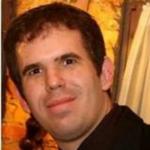 Dr. Denis B. Rosemberg received Ph.D. in Biochemistry from the Federal University of Rio Grande do Sul, Brazil. He is currently a Professor in the Federal University of Santa Maria Brazil. He is an advisor and immediate past Coordinator of the Graduate Program in Biological Sciences: Toxicological Biochemistry. He has cognitive experience in Biochemistry, with an emphasis on neurochemistry and behavior. In 2013, Dr. Rosemberg joined the International Zebrafish Neuroscience Research Consortium (ZNRC), USA and his research involves the characterization and validation of zebrafish-based models of neurological and neuropsychiatric disorders. His expertise is in experimental neuropsychopharmacology and pharmacological studies related to neuroprotective strategies, anxiety-like behavior, epilepsy, as well as the evaluation of noxious responses and behavioral patterns following exposure to stressors. He has authored more than 120 publications in reputable international peer-reviewed journals in the field. Dr. Rosemberg’s research is supported by CAPES, FAPERGS and CNPq fellowships.
Dr. Denis B. Rosemberg received Ph.D. in Biochemistry from the Federal University of Rio Grande do Sul, Brazil. He is currently a Professor in the Federal University of Santa Maria Brazil. He is an advisor and immediate past Coordinator of the Graduate Program in Biological Sciences: Toxicological Biochemistry. He has cognitive experience in Biochemistry, with an emphasis on neurochemistry and behavior. In 2013, Dr. Rosemberg joined the International Zebrafish Neuroscience Research Consortium (ZNRC), USA and his research involves the characterization and validation of zebrafish-based models of neurological and neuropsychiatric disorders. His expertise is in experimental neuropsychopharmacology and pharmacological studies related to neuroprotective strategies, anxiety-like behavior, epilepsy, as well as the evaluation of noxious responses and behavioral patterns following exposure to stressors. He has authored more than 120 publications in reputable international peer-reviewed journals in the field. Dr. Rosemberg’s research is supported by CAPES, FAPERGS and CNPq fellowships.
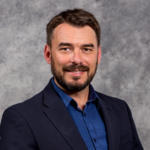 Dr. Diego Diel received his DVM degree from Federal University of Santa Maria (UFSM), Brazil in 2004. He conducted a MS in Virology at the same institution and then came to University of Illinois at Urbana-Champaign to conduct the research of his PhD degree, which was completed in 2010. Dr. Diel joint the USDA Southeast Poultry Research Laboratory in 2011 for post-doctoral training and then returned to the University of Illinois in 2013 for a second period of post-doctoral training. In August, 2014 Dr. Diel joined the Department of Veterinary and Biomedical Sciences at the South Dakota State University as an Assistant professor, in 2016 he became the section leader of the Virology section in the Animal Disease and Research Diagnostic Laboratory (ADRDL). In 2019, he joined the Department of Population Medicine and Diagnostic Sciences at Cornell University as an Associate Professor of Virology and Director of the Virology Laboratory at the Animal Health Diagnostic Center. Since joining Cornell, Dr. Diel has continued his research in swine virology focusing on vaccine and diagnostic assay development and viral pathogenesis. He has also expanded his research program to assess susceptibility of animal species, including swine, cattle and white-tailed-deer to SARS-CoV-2 infection.
Dr. Diego Diel received his DVM degree from Federal University of Santa Maria (UFSM), Brazil in 2004. He conducted a MS in Virology at the same institution and then came to University of Illinois at Urbana-Champaign to conduct the research of his PhD degree, which was completed in 2010. Dr. Diel joint the USDA Southeast Poultry Research Laboratory in 2011 for post-doctoral training and then returned to the University of Illinois in 2013 for a second period of post-doctoral training. In August, 2014 Dr. Diel joined the Department of Veterinary and Biomedical Sciences at the South Dakota State University as an Assistant professor, in 2016 he became the section leader of the Virology section in the Animal Disease and Research Diagnostic Laboratory (ADRDL). In 2019, he joined the Department of Population Medicine and Diagnostic Sciences at Cornell University as an Associate Professor of Virology and Director of the Virology Laboratory at the Animal Health Diagnostic Center. Since joining Cornell, Dr. Diel has continued his research in swine virology focusing on vaccine and diagnostic assay development and viral pathogenesis. He has also expanded his research program to assess susceptibility of animal species, including swine, cattle and white-tailed-deer to SARS-CoV-2 infection.
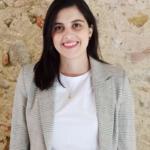 Diéssica Padilha Dalenogare is a pharmacist and master in Biological Sciences by Federal University of Santa Maria (UFSM). Currently, she is a PhD student in the Graduate Program in Pharmacology (concept CAPES 5) (UFSM). She developed part of her doctoral project at the University of Florence under the supervision of Professor Pierangelo Geppetti and owned a fellowship by CAPES- PrInt program (2019-2020). In the Pain Pharmacology laboratory (FARMACODOR), she investigates the TRPA1 and pain symptoms relation in two multiple sclerosis mouse models and collaborates with other projects in this research group.
Diéssica Padilha Dalenogare is a pharmacist and master in Biological Sciences by Federal University of Santa Maria (UFSM). Currently, she is a PhD student in the Graduate Program in Pharmacology (concept CAPES 5) (UFSM). She developed part of her doctoral project at the University of Florence under the supervision of Professor Pierangelo Geppetti and owned a fellowship by CAPES- PrInt program (2019-2020). In the Pain Pharmacology laboratory (FARMACODOR), she investigates the TRPA1 and pain symptoms relation in two multiple sclerosis mouse models and collaborates with other projects in this research group.
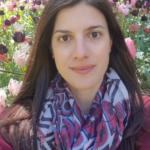 Dr. Gabriela Trevisan is currently Professor in the Department of Physiology and Pharmacology at the Federal University of Santa Maria (UFSM). She is also a permanent member of the Graduate Program in Pharmacology (concept CAPES 5) at the Federal University of Santa Maria (UFSM). In this Graduate Program, Prof. Gabriela leads the Pain Pharmacology Laboratory (FARMACODOR). In this laboratory, different projects that aim to observe the TRP channels’ participation in facial pain, cancer pain, and pain observed in multiple sclerosis were developed. She has about 10 years of experience in the research of pain mechanisms and the role of TRPA1 and TRPV1 in pain development in basic research. CNPq research productivity fellow (PQ1D).
Dr. Gabriela Trevisan is currently Professor in the Department of Physiology and Pharmacology at the Federal University of Santa Maria (UFSM). She is also a permanent member of the Graduate Program in Pharmacology (concept CAPES 5) at the Federal University of Santa Maria (UFSM). In this Graduate Program, Prof. Gabriela leads the Pain Pharmacology Laboratory (FARMACODOR). In this laboratory, different projects that aim to observe the TRP channels’ participation in facial pain, cancer pain, and pain observed in multiple sclerosis were developed. She has about 10 years of experience in the research of pain mechanisms and the role of TRPA1 and TRPV1 in pain development in basic research. CNPq research productivity fellow (PQ1D).

Dr. Isaac A. Adedara is a Professor in the Department of Biochemistry and the current Sub-Dean (Undergraduate), Faculty of Basic Medical Sciences, University of Ibadan. Dr. Adedara had his Postdoctoral training at the Auburn University, Auburn, USA and Federal University of Santa Maria, Brazil. He uses a wide range of contemporary and molecular biology tools including, but not limited to, spectrophotometric enzyme assays, western blotting and enzyme-linked immunosorbent assay to elucidate the molecular mechanisms of action of toxic compounds which have added to the body of knowledge in biomedical research. Dr. Adedara’s area of expertise is toxicology and has published more than 100 research papers in reputable international peer-reviewed journals. He is an editorial board member of the Journal of Biochemical and Molecular Toxicology (USA). He is currently a recipient of the “Jovem Talento com Experiência no Exterior”, from CAPES with Professor Denis B. Rosemberg as his preceptor.
 Dr. Isabela Finamor was born in 1986 in Santiago (Brazil). She graduated in Biomedicine at the Universidade Luterana do Brasil (Brazil) in 2007 and obtained her PhD in Pharmacology at the Universidade Federal de Santa Maria (Brazil) in 2015 doing a doctoral thesis under the supervision of Prof. Maria Amalia Pavanato, where she identified that aspartame triggers glutathione depletion due to an impairment in its synthesis, blocking the trans-sulphuration pathway. During her thesis, she also spent six months in the lab of Prof. Juan Sastre, Universidad de Valencia (Spain). She started her PostDoc in 2015 also in the lab of Prof. Sastre, who was interested in protein cysteinylation, an important feature of disulfide stress in inflammation. During her PostDoc, she spent three months in the lab. of Prof. Elias Arnér, Karolinska Institute (Sweden), with the aim of investigating the role of TRP14 in regulating protein function through control of cysteinylated Cys residues. She also received the SFRR-E Young Investigator Award in 2016 and the SFRR-E Early Career Investigator Award 2017. From 2017 to 2019, she came back to the lab of Prof. Pavanato as PostDoc fellow, collaborating with several works involving the glutathione-related antioxidant response of different fish species exposed to stressful situations. In September 2021, she started a new PostDoc at the Universidade Federal de Santa Maria (Brazil), in the lab of Prof. Pavanato, receiving a scholarship from the Capes-PrInt program.
Dr. Isabela Finamor was born in 1986 in Santiago (Brazil). She graduated in Biomedicine at the Universidade Luterana do Brasil (Brazil) in 2007 and obtained her PhD in Pharmacology at the Universidade Federal de Santa Maria (Brazil) in 2015 doing a doctoral thesis under the supervision of Prof. Maria Amalia Pavanato, where she identified that aspartame triggers glutathione depletion due to an impairment in its synthesis, blocking the trans-sulphuration pathway. During her thesis, she also spent six months in the lab of Prof. Juan Sastre, Universidad de Valencia (Spain). She started her PostDoc in 2015 also in the lab of Prof. Sastre, who was interested in protein cysteinylation, an important feature of disulfide stress in inflammation. During her PostDoc, she spent three months in the lab. of Prof. Elias Arnér, Karolinska Institute (Sweden), with the aim of investigating the role of TRP14 in regulating protein function through control of cysteinylated Cys residues. She also received the SFRR-E Young Investigator Award in 2016 and the SFRR-E Early Career Investigator Award 2017. From 2017 to 2019, she came back to the lab of Prof. Pavanato as PostDoc fellow, collaborating with several works involving the glutathione-related antioxidant response of different fish species exposed to stressful situations. In September 2021, she started a new PostDoc at the Universidade Federal de Santa Maria (Brazil), in the lab of Prof. Pavanato, receiving a scholarship from the Capes-PrInt program.
 Dr. Laura Orian was born in Venice – Italy (1971), graduated cum laude and got her PhD in 2001 in Chemical Sciences at the University of Padova (Italy) in the Theoretical Chemistry group. She is currently Associate Professor of Physical Chemistry in Padova. The goal of her research is to predict the chemical properties of a chemical system in advance of the experiment, for a rational design of functional molecules assisted by computer. She has published more than 95 papers in international peer-reviewed journals with approx. 1700 citations, and gave more than 40 talks at national and international conferences. L.O. is active in scientific divulgation and education; particularly, since 2015, she has been working with students and teachers of the secondary schools and organizes with and for them chemistry projects.
Dr. Laura Orian was born in Venice – Italy (1971), graduated cum laude and got her PhD in 2001 in Chemical Sciences at the University of Padova (Italy) in the Theoretical Chemistry group. She is currently Associate Professor of Physical Chemistry in Padova. The goal of her research is to predict the chemical properties of a chemical system in advance of the experiment, for a rational design of functional molecules assisted by computer. She has published more than 95 papers in international peer-reviewed journals with approx. 1700 citations, and gave more than 40 talks at national and international conferences. L.O. is active in scientific divulgation and education; particularly, since 2015, she has been working with students and teachers of the secondary schools and organizes with and for them chemistry projects.
 Dr. María Ángeles Esteban is currently professor and director of the Department of Cell Biology and Histology at the University of Murcia. María researches Cell Biology, Immunology and Biotechnology and is the head of the Immunobiology for Aquaculture team, at present integrated by 4 professor, 4 post-doctoral researchers and 11 PhD students. Her current projects are related to the immunology of farmed fish, mainly in those species of interest in the Mediterranean area (seabream and Euroepan sea bass). She has published more than 300 articles with more tan 450 co-authors . She is the editor-in-chief of the journal Fishes.
Dr. María Ángeles Esteban is currently professor and director of the Department of Cell Biology and Histology at the University of Murcia. María researches Cell Biology, Immunology and Biotechnology and is the head of the Immunobiology for Aquaculture team, at present integrated by 4 professor, 4 post-doctoral researchers and 11 PhD students. Her current projects are related to the immunology of farmed fish, mainly in those species of interest in the Mediterranean area (seabream and Euroepan sea bass). She has published more than 300 articles with more tan 450 co-authors . She is the editor-in-chief of the journal Fishes.
 Dr. Marina Venturini Copetti is an Associate Professor of the Department of Technology and Food Science at the Federal University of Santa Maria (UFSM), Graduated in Veterinary Medicine by UFSM, Master in Veterinary Sciences from the Federal University of Rio Grande do Sul – UFRGS and Doctor in Food Science from the State University of Campinas – Unicamp, with a period at the Technical University of Denmark. Member of the Brazilian Microbiology Society and advisor in the Graduate Program of Food Science and Technology for UFSM with a research area in mycology and food mycotoxycology, mainly investigating the deterioration of diverse food products by fungi and forms of control.
Dr. Marina Venturini Copetti is an Associate Professor of the Department of Technology and Food Science at the Federal University of Santa Maria (UFSM), Graduated in Veterinary Medicine by UFSM, Master in Veterinary Sciences from the Federal University of Rio Grande do Sul – UFRGS and Doctor in Food Science from the State University of Campinas – Unicamp, with a period at the Technical University of Denmark. Member of the Brazilian Microbiology Society and advisor in the Graduate Program of Food Science and Technology for UFSM with a research area in mycology and food mycotoxycology, mainly investigating the deterioration of diverse food products by fungi and forms of control.
 Dr. Miguel Ángel Peña Rico was born in Mexico City, where he lived for more than 25 years. He studied the career of Pharmaceutical Chemist Biologist at the National Autonomous University of Mexico (UNAM). Later, at UNAM, he did a master’s degree in Biochemical Sciences and in spare time he taught physiology in chemistry faculty. After that, he emigrated to Barcelona (Spain) and lived 6 years, where studied a Doctorate in Biomedicine at the Faculty of Medicine from the University of Barcelona. In 2012, he was hired for a project at the Chemistry Faculty of UNAM and taught Molecular genetics and Gene Therapy for postgraduate students. Two years later, he was hired by the Faculty of Medicine for one year as an academic technician and finally he joined the University of Papaloapan where he currently working as a professor-researcher and looking for alternative cancer therapies .
Dr. Miguel Ángel Peña Rico was born in Mexico City, where he lived for more than 25 years. He studied the career of Pharmaceutical Chemist Biologist at the National Autonomous University of Mexico (UNAM). Later, at UNAM, he did a master’s degree in Biochemical Sciences and in spare time he taught physiology in chemistry faculty. After that, he emigrated to Barcelona (Spain) and lived 6 years, where studied a Doctorate in Biomedicine at the Faculty of Medicine from the University of Barcelona. In 2012, he was hired for a project at the Chemistry Faculty of UNAM and taught Molecular genetics and Gene Therapy for postgraduate students. Two years later, he was hired by the Faculty of Medicine for one year as an academic technician and finally he joined the University of Papaloapan where he currently working as a professor-researcher and looking for alternative cancer therapies .
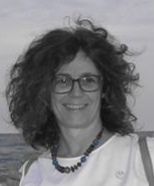 Dr. Montserrat Mitjans Arnal is an Associate Professor at the Section of Physiology (Biochemistry and Physiology Dept., Faculty of Pharmacy and Food Sciences, UB). Her research interest focussed on preclinical toxicology and the application of 3Rs concept, and she is member of the Cellular responses to xenobiotics leaded by Professor M. Pilar Vinardell, since 2001. She participated in several national and international projects, highlighting the Background review documents of existing alternative methods for eye irritation testing. 2. Red blood cell (RBC) haemolysis test with ECVAM (European Commission, 2004/S212-181576) and has been the responsible of different granted projects. Currently she participates in a specialization course aimed to evaluate the toxicological risk of cosmetics (13th editions) and in a doctoral course related to the 3Rs concept. She is vocal of the Ethics Committee for animal experimentation in Universitat de Barcelona. In summary, her expertise is mainly focused on the field of preclinical toxicology, and in the development of in vitro methods.
Dr. Montserrat Mitjans Arnal is an Associate Professor at the Section of Physiology (Biochemistry and Physiology Dept., Faculty of Pharmacy and Food Sciences, UB). Her research interest focussed on preclinical toxicology and the application of 3Rs concept, and she is member of the Cellular responses to xenobiotics leaded by Professor M. Pilar Vinardell, since 2001. She participated in several national and international projects, highlighting the Background review documents of existing alternative methods for eye irritation testing. 2. Red blood cell (RBC) haemolysis test with ECVAM (European Commission, 2004/S212-181576) and has been the responsible of different granted projects. Currently she participates in a specialization course aimed to evaluate the toxicological risk of cosmetics (13th editions) and in a doctoral course related to the 3Rs concept. She is vocal of the Ethics Committee for animal experimentation in Universitat de Barcelona. In summary, her expertise is mainly focused on the field of preclinical toxicology, and in the development of in vitro methods.
 Dr. Naresh Magan completed his BSc (Hons) Botany and MSc (Plant Pathology) at Exeter University, U.K. and his PhD at Rothamsted Research (external student Reading University, U.K.) in 1982. He was awarded a DSc by Cranfield University in 2013 for his research on “Ecophysiology of spoilage and mycotoxigenic fungi in food chains”. He holds the Chair in Applied Mycology at Cranfield University. He has carried out research on food security/safety and spoilage/mycotoxigenic fungi for 35 years. Current research includes: impact of climate change on fungal pathogens, especially toxigenic fungi pre- and post-harvest; ecology and control strategies for mycotoxins in staple food/feed chains using both physical and biological approaches; biocontrol of plant pathogens/pests and mycotoxigenic fungi in both durables and perishables; development of DSS systems for real time management of food chains pre- and post-harvest. He has published widely in these research areas with 325+ peer-reviewed Journal papers. He has an H-index of 62 (Scopus) and 82 (Google scholar).
Dr. Naresh Magan completed his BSc (Hons) Botany and MSc (Plant Pathology) at Exeter University, U.K. and his PhD at Rothamsted Research (external student Reading University, U.K.) in 1982. He was awarded a DSc by Cranfield University in 2013 for his research on “Ecophysiology of spoilage and mycotoxigenic fungi in food chains”. He holds the Chair in Applied Mycology at Cranfield University. He has carried out research on food security/safety and spoilage/mycotoxigenic fungi for 35 years. Current research includes: impact of climate change on fungal pathogens, especially toxigenic fungi pre- and post-harvest; ecology and control strategies for mycotoxins in staple food/feed chains using both physical and biological approaches; biocontrol of plant pathogens/pests and mycotoxigenic fungi in both durables and perishables; development of DSS systems for real time management of food chains pre- and post-harvest. He has published widely in these research areas with 325+ peer-reviewed Journal papers. He has an H-index of 62 (Scopus) and 82 (Google scholar).
 Dr. Pablo Andrei Nogara was born at Ijuí, RS, Brazil, in 1991. He received his degree in Chemistry at the Federal University of Santa Maria (UFSM) in 2014, with an exchange at the University of Oviedo (Spain). He received his Master’s degree in Organic Chemistry in 2016, and his Ph.D. in Biochemistry (2020), with a sandwich period at the University of Padua (Italy). He has experience in the in vitro evaluation of cholinesterases inhibitors, organic synthesis, and computational chemistry. His scientific interest has been concentrated on understanding the chemical interaction between mercury, sulfur, and selenium molecules with biological targets. Currently, he is working on the search and design of SARS-COV-2 proteins inhibitors.
Dr. Pablo Andrei Nogara was born at Ijuí, RS, Brazil, in 1991. He received his degree in Chemistry at the Federal University of Santa Maria (UFSM) in 2014, with an exchange at the University of Oviedo (Spain). He received his Master’s degree in Organic Chemistry in 2016, and his Ph.D. in Biochemistry (2020), with a sandwich period at the University of Padua (Italy). He has experience in the in vitro evaluation of cholinesterases inhibitors, organic synthesis, and computational chemistry. His scientific interest has been concentrated on understanding the chemical interaction between mercury, sulfur, and selenium molecules with biological targets. Currently, he is working on the search and design of SARS-COV-2 proteins inhibitors.
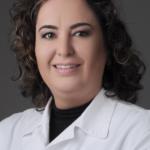 Dr. Tatiana Emanuelli is Full Professor in the Departament of Food Technology and Science from the Federal University of Santa Maria (Brazil), where she teaches Food Biochemistry, Food Toxicology and Nutraceuticals. She benefits from a multidisciplinary background, with great focus on human health, thanks to a Bachelor’s degree in Pharmacy, and Master and PhD degrees in Biological Sciences – Biochemistry. Her research is focused on the biological effects and digestive transformation of food bioactive phytochemicals, with a special interest in carotenoids and phenolic compounds. In addition to numerous peer-reviewed publications, Master, PhD and post doctorate supervisions, she has also been the principal investigator of more than 15 projects supported by Brazilian funding agencies. In 2014, she was the one of the ten Brazilian researchers that received the CAPES/Elsevier Award for Women in Science in Brazil.
Dr. Tatiana Emanuelli is Full Professor in the Departament of Food Technology and Science from the Federal University of Santa Maria (Brazil), where she teaches Food Biochemistry, Food Toxicology and Nutraceuticals. She benefits from a multidisciplinary background, with great focus on human health, thanks to a Bachelor’s degree in Pharmacy, and Master and PhD degrees in Biological Sciences – Biochemistry. Her research is focused on the biological effects and digestive transformation of food bioactive phytochemicals, with a special interest in carotenoids and phenolic compounds. In addition to numerous peer-reviewed publications, Master, PhD and post doctorate supervisions, she has also been the principal investigator of more than 15 projects supported by Brazilian funding agencies. In 2014, she was the one of the ten Brazilian researchers that received the CAPES/Elsevier Award for Women in Science in Brazil.
 Dr. Xavier Lambert, Professor Emeritus in fine art at Jean Jaurès University, Toulouse, France. Interest ed since the early 1990s in artistic creation in its relationship to current technologies as a researcher and as an artist. Has an artistic practice that has led to questions about how digital tools could contribute to defining new postures regarding the relationship between the artist and his work, particularly because of the procedural dimension that characterizes this type of production. It is in this perspective that the research has focused on the question of systems as a process and as a conceptual tool referring to an increasing number of practices in the field of contemporary art. The field of study covers in particular the practices related to contemporary technologies, whether they are digital technologies, bio-technologies, etc. And, more recently but in continuation, he is interested on how to approach certain poetic processes from the cognitive sciences, from a practice on a certain form of automatic drawing.
Dr. Xavier Lambert, Professor Emeritus in fine art at Jean Jaurès University, Toulouse, France. Interest ed since the early 1990s in artistic creation in its relationship to current technologies as a researcher and as an artist. Has an artistic practice that has led to questions about how digital tools could contribute to defining new postures regarding the relationship between the artist and his work, particularly because of the procedural dimension that characterizes this type of production. It is in this perspective that the research has focused on the question of systems as a process and as a conceptual tool referring to an increasing number of practices in the field of contemporary art. The field of study covers in particular the practices related to contemporary technologies, whether they are digital technologies, bio-technologies, etc. And, more recently but in continuation, he is interested on how to approach certain poetic processes from the cognitive sciences, from a practice on a certain form of automatic drawing.
PROGRAM
All times are shown as Brasília Time (GMT-3)
November 23, 2021
Theme 1 – Shared environment
Session 1 – Viral diagnosis and vaccines: from animal to human health – Chairs: Prof. Eduardo Flores (PPGMV, UFSM) and Prof. Darci Raquel Fonseca (PPGART, UFSM).
Language: English and French with English caption
Theme 1 – Shared environment
Session 2 – Environmental pollutants: a hidden hazard for human health – Chairs: Prof. Denis Brook Rosemberg and Prof. Vania Loro (PPGBTOX, UFSM)
Language: English and French with English caption
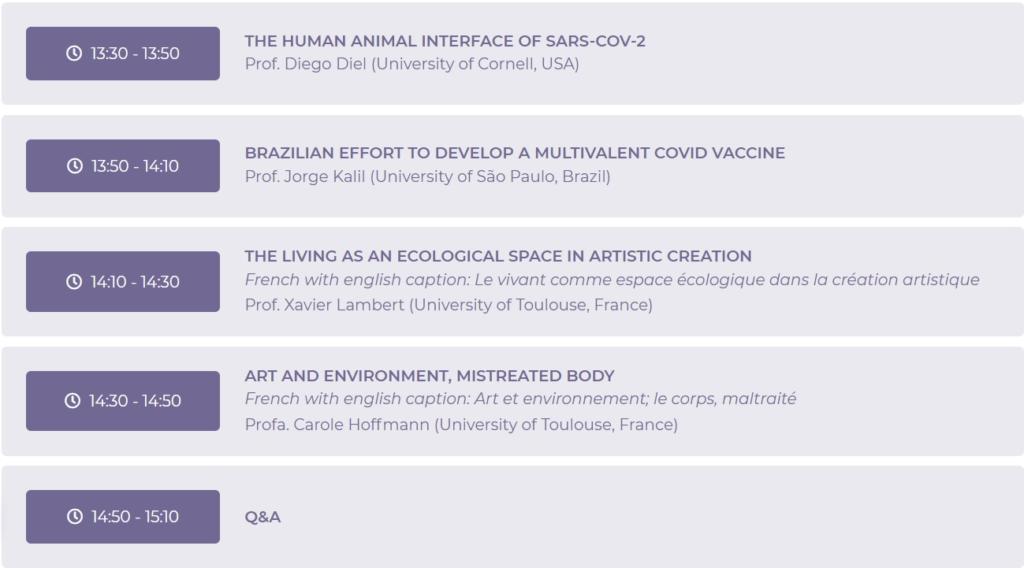
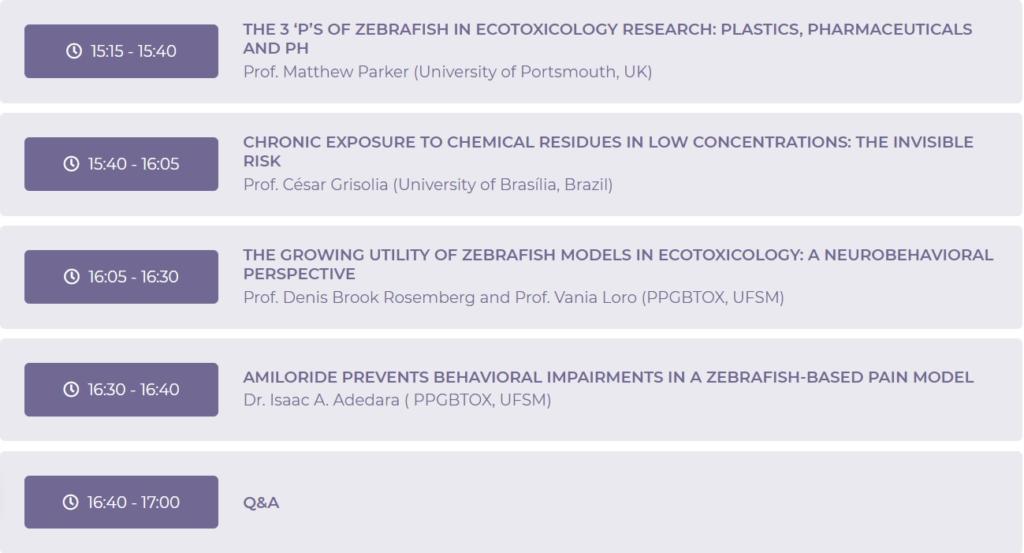
November 24, 2021
Theme 2 – Shared medicines e intervations
Session 1 – Pain control: a complex challenge for animal and human welfare – Chairs: Prof. Gabriela Trevisan (PPGFarm, UFSM)
Language: English and Portuguese with English caption
Theme 2 – Shared medicines e intervations
Session 2 – Cancer research: perspectives of new compounds and non-animal approaches. Chairs: Prof. Letícia Cruz (PPGCF, UFSM) and Prof. Roberto Christ (PPGCF, UFSM)
Language: Spanish with English caption
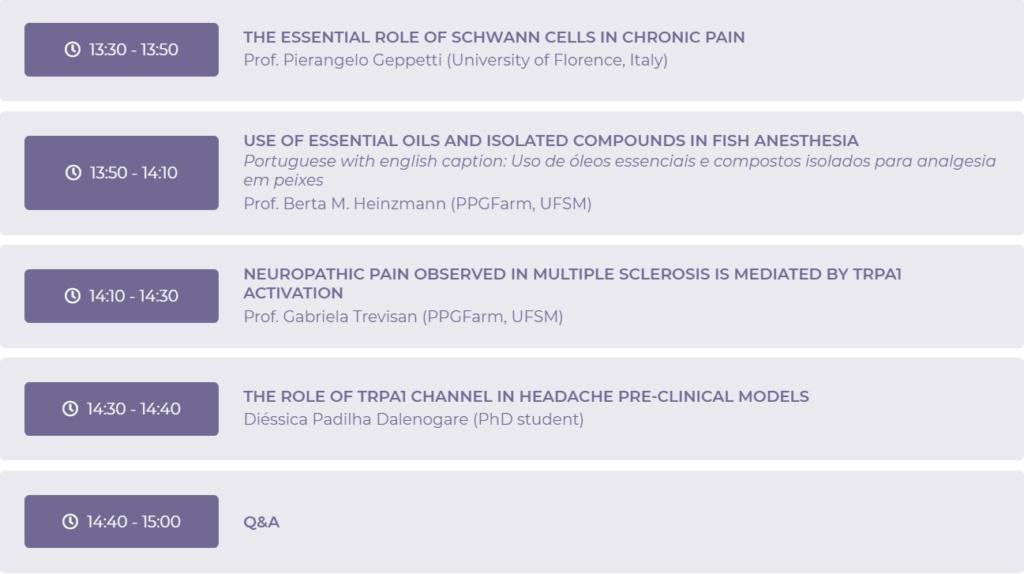
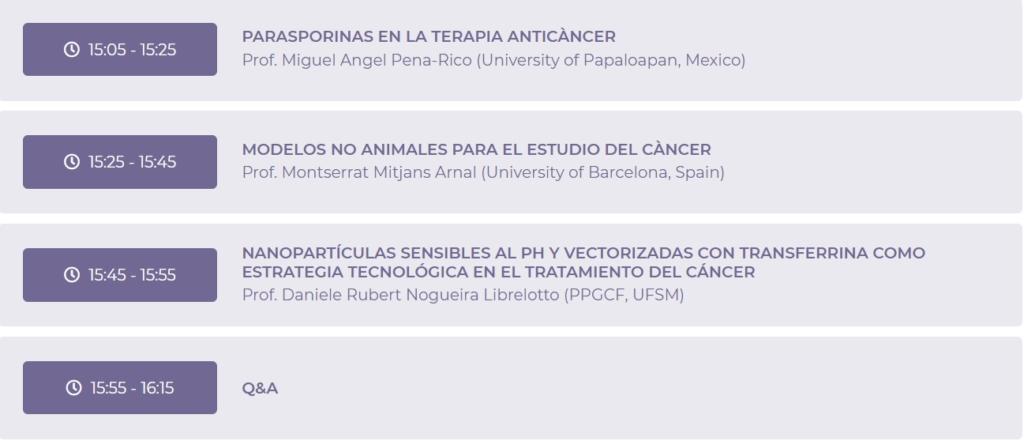
Theme 2 – Shared medicines e intervations
Session 3 – Cancer research: perspectives of new compounds and non-animal approaches. Chairs: Prof. Letícia Cruz (PPGCF, UFSM) and Prof. Roberto Christ (PPGCF, UFSM)
Language: English
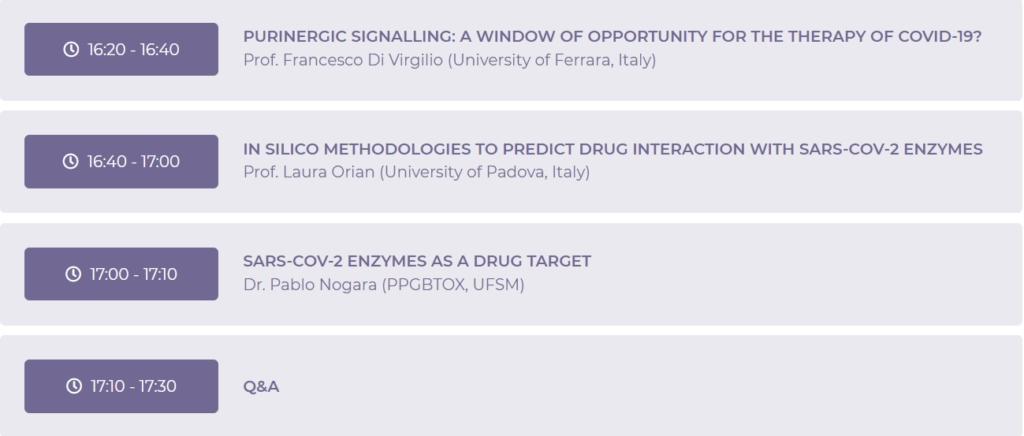
November 25, 2021.
Theme 3 – Safe food and food systems
Session 1 – From fish welfare assurance to safe food products – Chair: Prof. Ana Paula G. Almeida (PPGFarm, UFSM) chair: Prof. Maria Amália Pavanato (PPGFarm, UFSM)
Language: Spanish with English caption
Theme 3 – Safe food and food systems
Session 2 – Clean technologies for food processing and extraction of bioactive compounds – Chair: Prof. Juliano Smaniotto Barin (PPGCTA, UFSM) chair: Prof. Jesús Lozano-Sánchez (University of Granada, Spain)
Language: English
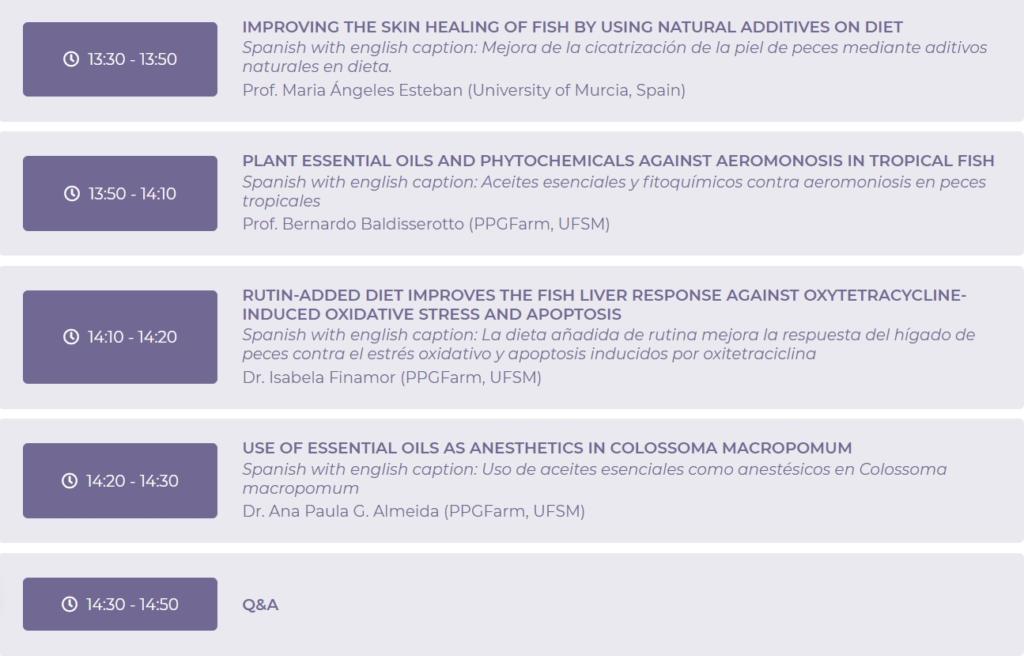
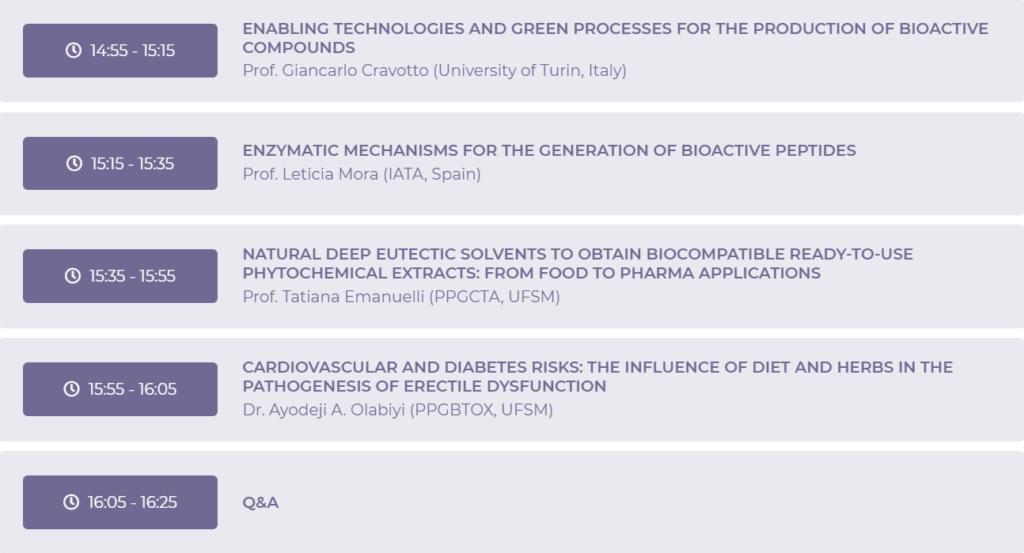
Theme 3 – Safe food and food systems
Session 3 – Food safety from farm-to-fork – Chairs: Prof. Marina V. Copetti (PPGCTA, UFSM) and Prof. Ana Flávia Furian (PPGCTA, UFSM)
Language: English and Portuguese with English caption
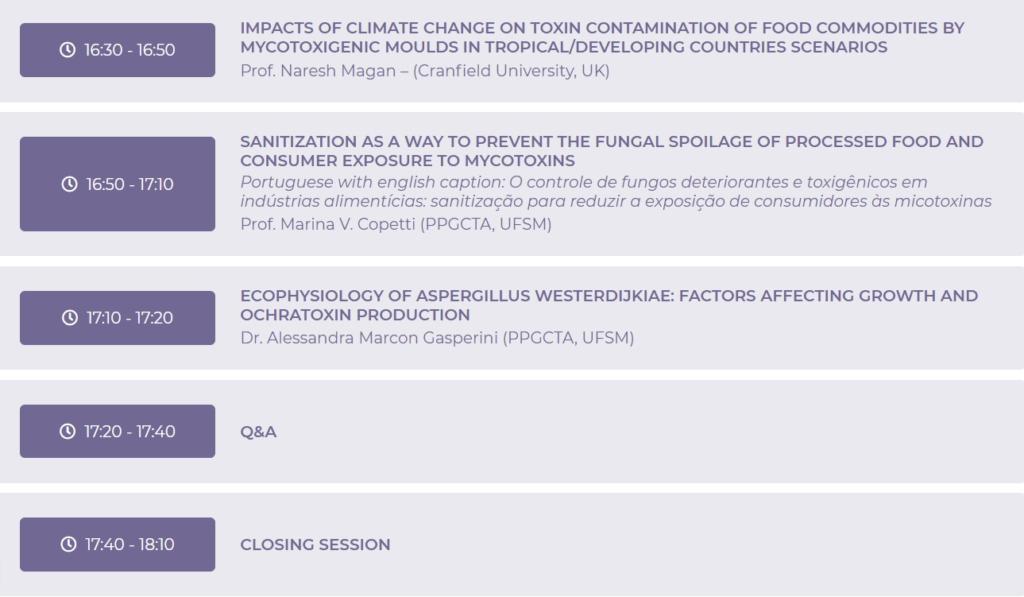
ORGANIZERS
